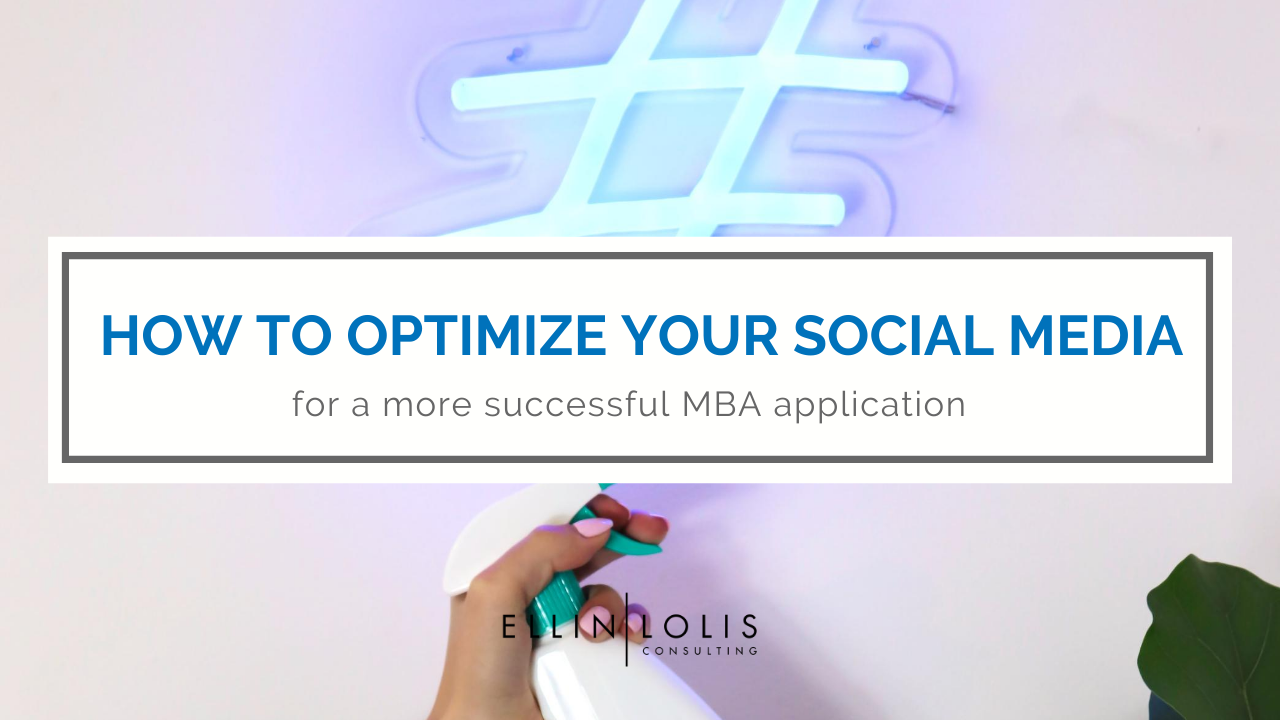UPDATE: This article was originally posted on September 20, 2019. It has been updated with new information and tips below.
At one time, an MBA acceptance letter hinged upon essays, interviews, CVs, and letters of recommendation, however, applicants now have another factor to consider: their social media presence.
If you think MBA admissions teams aren’t checking the social media accounts of applicants to discover their fit with the program or identify red flags, think again.
According to a Kaplan Test Prep survey, 40% of university admissions teams view applicants’ social media accounts. Importantly, 71% of admissions teams consider what they see on social media to be a fair factor in delivering an acceptance letter or a rejection letter.
That means that now, more than ever, admissions committees are doing their social media due diligence when deciding if you’re in. With that in mind, here’s what you need to know about optimizing your social media for your MBA application.
Google Yourself
First things first! Know what comes up on Google, Bing, Yahoo and other major search engines when an admissions committee searches your name.

Chances are it will be your LinkedIn, profile page from your company and perhaps a few links to your current social media, but it’s wise to know if a long-forgotten MySpace account offers some less favorable impressions of you on Page 3 of the search results.
Remember: search your name while signed out of your Google account and try “incognito mode,” as cookies and previous searches may skew your results. Do some digging into the image search results, too!
If you’ve changed your name at any point in your life, make sure you also run a search for your previous name.
What you find during these searches will influence the next step of your social media optimization.
Public vs. Private Social Media Settings
Some MBA applicants might argue it’s best to go on social media lockdown, making only their LinkedIn visible to the public. Some MBA applicants might argue this level of privacy could be seen as hiding something from the adcom.
The truth is, whether you leave your profiles public or private depends on the content, which you discovered when you analyzed your name’s search results.
If, for example, your Instagram is filled with family photos and a few articles about volunteer work you’re engaged in, this content only helps you and reinforces your essays on social impact.
On the other hand, if you’ve used social media or vent about your boss and display evidence of your weekend shenanigans at the local microbrewery, going private with your profiles is a wise choice.
Are you curious what content should stay and what should go? Read on below!
What Content Should Be Removed From Social Media?

There are obvious things you don’t want an admissions committee coming across. Anything illegal, showing substance abuse or content you’d hate for your grandma to see is, by no surprise, not fit for the public social media accounts of an MBA applicant.
You already know that the crazy video from Cancun in 2015 needs to be taken down, but there’s more on social media you should be looking for and removing.
- Anything that disparages a former company, boss or university: They may assume that, if you wrote this about someone else, you will write this about their professors or program—plus, it does not create an image of an emotionally intelligent professional.
- Misspelled, grammatically incorrect posts: Nobody is looking for perfect grammar and spelling on social media, but having many posts with really poor grammar will not make you seem professional or qualified. This is especially important for non-native English speakers who must prove their language abilities.
- Fake news/poor quality articles from less-than-reputable publications: Sure, you may believe Bigfoot orchestrated the moon landing, but Stanford might disagree—and think twice about how you assess and consume information.
- Contradictory content: If your essays talk about your dreams of entrepreneurship in Brazil, but your social media posts show you can’t wait to return to NYC so you can join Morgan Stanley, you’ll erode your application’s credibility.
- Excitement about other programs: You’re thrilled HBS extended an interview invitation, but if LBS’ adcom reads a post that says you are interviewing with your dream program, it’s going to be an awkward interview—if they offer one at all!
TOP TIP: If you wouldn’t show it to your grandmother, you might not want to keep it online. Remember, future employers will Google you too!
But don’t think that all of your social media content is a liability. In fact, social media content can be a valuable tool.
Content Admissions Committees Want To See From Applicants
In the few thousand – or hundred – words you’ve sent to your preferred program, you’ve told them about your achievements, career and goals. Fortunately, social media can help drive these points home.
If you’ve chosen to leave your social media public, you have a chance to share, post and curate content that reinforces your values and your accomplishments, expanding your personal brand.
This may be the perfect time to write an article on LinkedIn about your startup that secured funding or the community service project you’re leading. You could share photos on Instagram for #throwbackthursday, celebrating your success with a junior enterprise during undergrad or to share a photo of you summiting a peak you climbed.
Content that humbly shows your success, work, values and fit with the programs you’ve applied to will only help your case.
However, be careful not to turn your social media into a parade of what you think the adcom wants to see. A few tasteful choices that show your life behind the scenes is a nice addition to your online presence. A fake persona might not be so appealing.

In certain other cases, former clients have also used social media to demonstrate a unique aspect of their profiles that wasn’t addressed elsewhere.
For example, our client Maria included a link to her Instragam account on her MBA CV. With 100k+ followers, numerous brand deals, and excellent content on her restaurant review account, she was able to demonstrate not only an extracurricular passion but was also able to demonstrate she had serious smarts when it comes to promoting her ideas effectively.
When the adcom does a check of your accounts, they will have the same positive impression they gained from your application.
Focus Efforts On Your Linkedin
You might’ve only been able to submit 2 letters of recommendation, but LinkedIn won’t limit you to just two recommendations!
Since admissions committees are almost certain to check LinkedIn, spend time writing LinkedIn recommendations for past and current colleagues from both your career and education. Why? Often, writing a LinkedIn recommendation for someone leads them to write one for you, too.
However, if you feel they’re unlikely to respond to this method, you can send an email or a direct message on LinkedIn stating why you’d like to request a recommendation, offering a few ideas or examples of what they may include.
Fortunately, you must approve all recommendations that come through LinkedIn, so you have the discretion to publish (or not publish) the recommendations you receive.
While you’re working on LinkedIn, triple check that the information you’ve mentioned on LinkedIn is consistent with your application and CV. If the adcom finds even an honest mistake, like inconsistent dates or incorrect stats, they may call your credibility into question.
Are your social media profile images telling the right story?
They say a picture paints a thousand words—so make sure the words your social media images are saying align with your goal and personal brand.
Check that your social media profile and cover images are:
- High-quality and not pixelated: Choose pictures that are crisp, clear and show you understand technology.
- Recent and up-to-date with your current style: A ten-year-old photo may create a different perception than who you are today.
- Appropriate for the platform: Your professional headshot from LinkedIn may not quite work for your foodie-centric Instagram account, for example, and take away a more personal look into who you are.
While this may sound obvious or even trivial, your visual brand absolutely matters because it shows the adcom who you are and what you’re like at a glance. Few, if any, admissions committees are seeking identical applicants, so show your authentic self with these images. Consider the programs you’re applying to, look at how their current students and alumni use social media images and make your decisions based on these insights.
Social media can be another tool in your MBA application arsenal, or a defeating factor in your MBA dreams, so spend several hours auditing and upgrading your social media presence. With these optimization tips, you’ll have a social media presence that makes you a more qualified and impressive applicant!
If you’re serious about your MBA dreams and want to work with a team that can help you optimize your MBA application from the application phase to the interview stage to negotiating an acceptance offer—and ensure your social media is on point—reach out and learn more about working with us.
You’ll discover how our MBA consulting has led 98.7% of our clients to the MBA programs of their dreams!
Real MBA Essays That Got People In
School-specific sample essays that got our clients accepted






